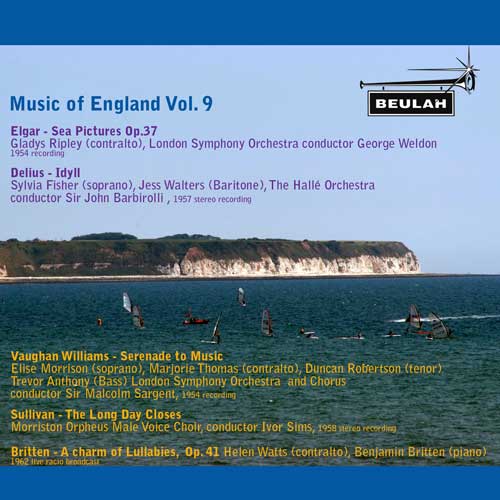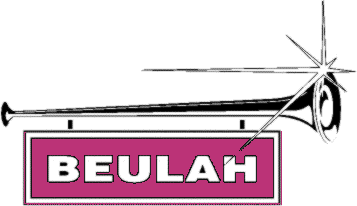Many music lovers miss the sound from vinyl pressings.
Many others have yet to discover how pleasant the sound can be.
Most of our albums are mastered from vinyl LP pressings and earlier
recordings (before 1953) from 78 rpm discs. It is our ability to
recreate, in the digital age, the sound from the disc era that many of
our customers find most enjoyable.
Unlike modern digital recordings tracks in our
albums do contain some distortion, and the occasional surface noises,
but for many listeners these "defects" are soon forgotten.
What the Critics Say
The following are reveiws by Brian Wilson at Music
Web International
"Solomon’s recording of the Bliss – he usually omitted
his surname –
is extremely valuable. He was the soloist at the premiere in New York
in 1939, the recording of which has been reissued on APR5627. Sir
Adrian Boult was the conductor there as on the Beulah reissue, but both
he and Solomon seem even more at home with the Liverpool Phil and the
1939 sound, as streamed from Qobuz, is rather dim and swishy. The 1943
recording, justly hailed as a magnificent achievement by AR in
Gramophone, in July 1943, blasts a little at the opening – I recommend
turning down the volume somewhat – but soon settles down in this very
good Beulah transfer."
"Barbirolli’s beautiful arrangement of music by
Purcell with a prominent part for his wife, Evelyn Rothwell, is not
available on the Barbirolli Society’s own series of CD reissues, so its
inclusion here is very welcome."
"The Pritchard recording of the Ritual Dances – the
only part of The Midsummer Marriage likely to appeal to a wider
audience – is a classic recording which still sounds very well in this
transfer." "
 |

|
"I haven’t yet heard the new Hallé recording of
Elgar’s Sea Pictures
, so my benchmark remains Dame Janet Baker, whose wonderful recording
with Sir John Barbirolli is enough to make the listener forget the
banality of Lady Elgar’s words. I began to listen to Gladys Ripley with
a degree of trepidation – pre-Baker contraltos, including, I regret to
say, Kathleen Ferrier, were mostly given to plumminess – but I enjoyed
hearing this recording and intend to return to this very good transfer,
especially as I’m not allowed to play the Cello Concerto which is
coupled with the Baker/Barbiolli recording – my better half finds
Jacqueline du Pré too intense to bear. At first I thought the
performance a little understated but soon changed my mind. I always
thought George Weldon somewhat under-rated, especially in Elgar and
this recording confirms that impression: his recording of Cockaigne,
Serenade for Strings, and other works would still be worth
reissuing" (Beulah intend to release these in 2016)
"I was surprised to find the Delius Idyll which
followed musically
somewhat diffuse and something of an anti-climax after the Elgar, but
it and the other works also receive very fine performances – especially
the VW, of which this is a classic version but not, I think, otherwise
available."
"
" ‘Kenneth J. Alford’ was the pen-name of Warrant
Officer, later
Major, Frederick Joseph Ricketts, a skilful and prolific composer of
military music, which Beulah have made something of a speciality. "
"Many of the performances are authoritative – directed
by Alford
himself, under his real name and, though the older recordings sound
their age, they are mostly perfectly tolerable, especially as surface
noise is almost totally inaudible without any loss of upper
frequencies. Track 5, By Land and Sea , is rather wheezy: try sampling
it from Qobuz and if you can tolerate it the rest should be all right. "
"I’m listening and writing this review immediately
after the two-minute silence on Remembrance Sunday and the music sets
the mood ideally. It’s a mark of Alford’s distinction that most rival
recordings of his music are performed by US military bands. "
"I have heard some very thin-sounding transfers of
these classic performances over the years but this Beulah release makes
it sound almost as good as Supraphon’s own or the Naxos Historical and
thus better than any other that I know. Supraphon and Naxos perhaps
shave off more of the brightness from the top but the Beulah sound is
more than acceptable. Naxos lose some of the treble in taming the top –
slightly muddy instead of slightly glassy – but both Beulah and Naxos
transfer from LP, which means that the cut in the Supraphon CD of Tabor
is restored. As for the performances they excel all but the very best
of the more recent recordings."
"
"Another well-filled Beulah Dvorák reissue brings very
decent transfers of the Piano Concerto, Op.33 [38:38], with František
Maxián a persuasive soloist in the Kurz revision, and the first set of
Slavonic Dances, Op.46 [37:36], both with Václav Talich at the helm,
dating from 1951 and 1950"
"Reissue of the Month"
"If I hail the Monteux recording of the symphony as a
very special old friend, that doesn’t mean that I’m disregarding the
concerto. This Beulah reissue is good value for the Concerto and
mandatory for the Symphony."
"Sibelius is known to have enjoyed Beecham’s
recordings of his music, eagerly anticipating forthcoming releases so
that, though these reissues may not be as authoritative as those of
Kajanus, they are certainly well worth preserving.
."The recording of the symphony used to be available
in CD transfers from Dutton and the Beecham Trust but I can’t find
either in the current catalogue. This reissue of the 1942 version,
which has a strong claim still to be regarded as the benchmark, is very
welcome. You wouldn’t mistake the transfer even for a mono LP, but it’s
very tolerable. "
"The recordings of the Violin Concerto and the music
from Scènes Historiques have also been very well transferred on
Naxos Classical Archives, together with the King Christian II
music. The Beulah transfers sound very acceptable for their age, though
the concerto is old enough to have been first released in the UK on 78s
and sometimes sounds a little brittle. The excerpts from the two sets
of Scènes Historiques make up some typically affectionate
Beecham lollipops."
